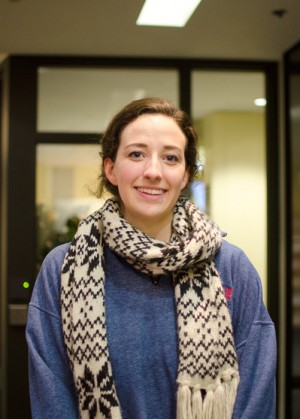Katie Duff, U3 Electrical Engineering, is using her passion for her field of study to further cancer research and create new modes of early detection for aggressive forms of cancer.
Duff began her journey in the Faculty of Science, but after changing programs five times, she finally landed in the Department of Electrical Engineering, with a minor in software engineering. Duff switched to engineering in order to focus less on theory and more on solving problems, like operating with budgetary and material constraints, and work on tangible projects with finished products.
Although she took part in interesting projects in her classes, including building robots and AM radios, Duff’s favourite project is the one she has been working on outside of class since the beginning of last summer. Duff is assisting Milica Popovich, Associate Professor of Electrical and Computer Engineering, in designing a bra that uses low-energy microwave radiation to detect breast cancer tumours. X-ray mammography has ionizing radiation and can actually cause breast-cancer if used too often. For this reason, it is only safe to use once or twice a year—which can be a problem for aggressive forms of cancer that can go from Stage I to Stage III in as little as six months. Low-energy radiation, however, is safe to use more frequently, and can help prevent the spread of aggressive cancers through earlier detection.
Duff first heard about the project at a banquet for the International Association of Electrical Engineers (IEEE), which she had been asked to co-host. She was keen to pursue the project because it utilizes both aspects of her degree: Signal processing, which involves electrical engineering, and computer programming, which requires knowledge in software engineering. She also cites recent family events, which convinced her this was an especially important project.
“My aunt recently had breast cancer and the problem [was] that it developed super quickly between her two mammogram scans—and that’s the exact situation that [this project] is trying to deal with,” Duff said. “If you detect [the cancer in] its first stage, there’s a 99 per cent survival rate. But when you get to the third stage, it drops down to [around] 24 per cent.”
Although Duff wasn’t initially eligible to assist with this research as she lacked the prerequisite courses, her passion for the project drove her to seek out Popovich and convince her to take her on.
“I emailed [Popovich] and was like, ‘I know that I’m not eligible at all but meet with me anyway,’” Duff said. “I [told her] ‘I will learn anything, I’m a hard worker, [and] I really care about [the project]. You will not regret this.’”
The bra has just recently been approved by the ethics board, and will hold clinical trials throughout November, which Duff will continue to be a part of. This will allow her to work with doctors and patients, and practice communicating the details of her project in a clear and accessible manner. Duff already possesses plenty of communication skills experience conveying information thanks to her position as manager and math tutor for the Peer Tutoring Service in the Faculty of Engineering. She enjoys the opportunity to help younger students stay positive and feel confident in their abilities.
“I think there’s a lot of pressure in engineering […] that you’re supposed to just ‘get it’ [and people think] ‘If I can’t just get it, I shouldn’t be here,’” Duff explained. “[I like] having people say ‘I get it,’ or have people email me and be like ‘You’re the reason I passed this class.’ I think that’s the most rewarding thing—to have someone [say], ‘You know what, I’m not bad at this; I can do this.’”
Duff strives to maintain a well-rounded university experience that is not confined to academic study. She is a choir singer, a former athlete on the McGill Nordic Ski Team, and a member of a mentorship group for students called Promoting Opportunities for Women in Engineering (POW) McGill. She is passionate about increasing female representation in engineering—a field whose ‘boys club’ image can be intimidating.
“The biggest thing is that [often] girls who go into engineering are girls who excel—[they] know that they can be good at it because [they] had to be really good at it in high school,” Duff explained. “But there are guys […] who are not top students—they’re doing fine, well enough to get into the program but they by no means feel they are the best or the most brilliant—and still [think] they can do [it]. My vision for […] girls in engineering is to meet a girl who’s doing badly in engineering, and to have her not feel like she should drop out.”
Duff hopes to increase female visibility by being a role model and support system for other female engineers. With one year left to go in completing her degree, she is looking forward to spending it immersing herself in the music, sports, clubs, and academics that she thoroughly enjoys within McGill and Montreal alike, and is excited about the prospects for future research opportunities that her degree will lead to.









